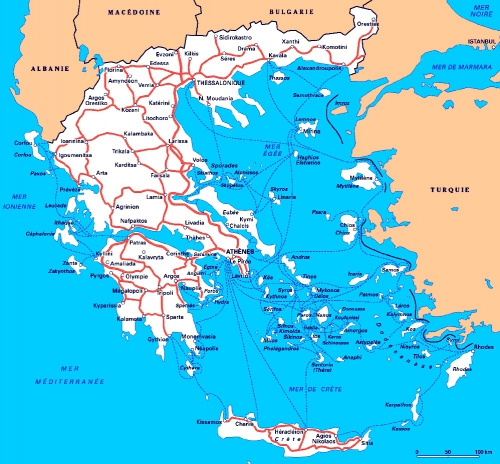dimanche, 20 décembre 2015
The Aegean Sea and Turkey's Maritime Strategy

The Aegean Sea and Turkey's Maritime Strategy
On December 13th, another incident added fuel to the fire of the already damaged Russian-Turkish relations.
A Turkish fishing vessel, not responding to radio and visual signals, began to approach the Russian patrol ship, Smetlivy, which was anchored at the time of the incident.
To avoid a collision, the crew fired several warning shots at the Turkish vessel, after which it immediately changed directions.
The Russian Defense Ministry explained that two scenarios were possible: it was either a deliberate provocation, or simple sloppiness. The Turkish side said that Russia's reaction was excessive, even though Moscow had previously made an official warning that it would destroy all targets that it saw as a threat.
Indeed, the Turkish vessel's maneuvers could reasonably have been construed as threatening. If, for example it had indeed collided with the Russian patrol ship, and broke a Russian ship board, it would have placed an important naval unit temporarily out of commission, among other possible consequences.
Greek press has uniquely regarded the incident as a deliberate provocation on the part of Turkey. Taking into account that it happened in the daytime and in good visibility, this version of events is most likely. Why is Turkey trying to escalate the conflict further, this time at sea?
What interests does Ankara have in the Mediterranean? Are many islands in the region a potential hotspot in a potential conflict, as are the Spratly Islands in the South China Sea?
The political geography of the region is characterized by islands in the eastern part: Chios, Iraklides, Rhodes, Samos, Kos and many others, which are very close to the Turkish coast, but in fact are Greek territory. The boundaries were established in accordance with the Treaty of Lausanne, which recognized the dissolution of the Ottoman Empire and established Turkey's current borders. At this time, it lost not only the Aegean Sea islands, but also control over Arabia, Egypt, Sudan, Tripolitania, Cyrenaica, Mesopotamia, Palestine, Transjordan, Lebanon and Syria, with new states being created these regions.
However, modern Turkey's strategic doctrine is oriented towards returning the lost territories or at least a degree of control over them. This neo-Ottomanist doctrine, explained in Prime Minister Ahmet Davutoglu’s work entitled Strategic Depth, insists on Turkey's leading role in the Mediterranean, North Africa, the Middle East and the southern Balkans. There is a parallel Pan-Turkist project for Central Asia which Turkey is also pushing for.
Regarding Ankara's interests in the Mediterranean, attempts to restore its sea power also has historical sources in the Ottoman Empire's golden age.
The Algerian pirate Hayreddin Barbarossa, who proclaimed himself as a Sultan and recognized the Ottoman Empire's supreme power in the early 16th century, successfully fought against Spain and the Holy Roman Empire. The Ottoman ruler, Suleiman I, appointed Barbarossa to the position of Commander-in-Chief of the Navy and gave him the title "Emir of Emirs", and he was feared by all of the Mediterranean fleets of European monarchies. For many years even after his death, every Turkish ship leaving the Golden Horn Bay would fire a volley in honor of the Turkish captain, pirate, and sailor.
Hayreddin Barbarossa once said: "Who rules the seas, rules the world." One of the founders of Anglo-Saxon geopolitics, Halford Mackinder, interpreted the phrase differently in terms of Russia and Eurasia. In keeping with the characteristic style of British kleptocratic politics (both in resources and ideas), the English crown, after the success of Barbarossa, began to encourage the practice of piracy and the plundering of the ships of London's rivals.
When understood in this context, Turkey's regional policy will become clearer. Adding to it the mercantile interests of close-in coastal islands with natural resources, mineral reserves, as well as areas rich in oil and gas.
Turkey and Greece have already had disagreements on gas production.
In 2009, Greek Energean Oil & Gas discovered oil reserves of 4 billion barrels in the northern Aegean Sea. Intensified drilling in offshore waters then started, as well as research on the prospects for oil and gas production. Greece did not make an exclusive claim to rights over this economic zone so as to avoid delays and disputes, and start production near their islands. However, in 2011 Turkey declared that it would consider this as purely military aggression. The diplomatic friction was worsened by repeated violations of Greek airspace by Turkish military jets.
Since Greek Cyprus signed an agreement with Israel on the joint development of fields, it gave Turkey concerns about new possible allies for Greece in the production and transportation of energy resources.
Obviously, Ankara regarded Russia as such a potential ally.
After the sanctions adaptation against Turkey, it became clear that it would also act on behalf of the West and Ukraine's side, trying to hinder Russia in Crimean efforts. However, a possible Russian-Greek alliance (cooperation in different directions) can frustrate some of the Turkish aggression against Greece, as well as against Russia.
00:05 Publié dans Actualité, Affaires européennes, Géopolitique, Histoire | Lien permanent | Commentaires (0) | Tags : histoire, géopolitique, grèce, turquie, politique internationale, méditerranée, mer égée, égée, europe, affaires européennes |  |
|  del.icio.us |
del.icio.us |  |
|  Digg |
Digg | ![]() Facebook
Facebook



Les commentaires sont fermés.